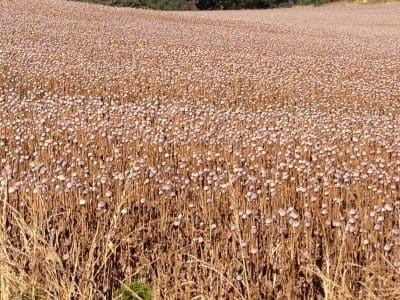New South Wales has become the latest state to legalise the production of alkaloid poppies, after the Poppy Industry Bill 2016 passed through the NSW Parliament yesterday.
Tasmania was the first to grow poppies for medical purposes in 1966, holding a long running monopoly until it was joined by Victoria and the Northern Territory in 2014.
South Australia is in the process of legalising the industry and is expected to grow its first crops in 2017.
Grown under strict legal conditions, the poppies are refined into pain-relieving medications such as morphine, codeine and thebaine.
NSW Minister for Primary Industries, Niall Blair, said the Bill enabled alkaloid poppies to be safely and securely grown in NSW for the production of vital medicines.
“Opiate-based medications are used for a wide range of conditions, including pain relief, palliative care and anti-addiction medications,” he said.
“An alkaloid poppy industry in NSW also provides an opportunity to establish a new high-value rural industry with a well-established international reputation and strong prospects for future growth.”
The poppy industry is highly regulated at state, national and international levels, with the industry complying with strict licence conditions and rigorous requirements.
The poppies can only be grown by licensed growers with a contract to a licensed processor, and all products are stringently tracked as they move through the supply chain.
First crops in 2017
The first alkaloid poppy crops in NSW are expected to be planted in 2017, with poppy processors and contracted growers able to apply to the NSW Department of Primary Industries for a licence.
NSW Farmers’ president, Derek Schoen, said the move would provide a high value, niche market opportunity for those growers able to meet the safeguards.
“The Poppy Industry Bill 2016 will allow licensed processing companies to establish poppy supply arrangements with farmers in NSW,” Mr Schoen said.
“It will establish robust regimes preventing unauthorised growing or use of the poppies that will ensure the industry is able to meet the state’s strong community standards as well as our international obligations.
“This move recognises that a safe and stable jurisdiction like NSW is able to safely contribute to the world’s growing need for alkaloid poppy based pharmaceutical medicines.”
Expansion secures supply
Poppy processor TPI Enterprises managing director, Jarrod Ritchie, said the passing of legislation to allow the establishment of a poppy industry in NSW was good news for NSW farmers and the pharmaceuticals industry.
“The further expansion of poppy growing on the mainland will ensure Australia remains a global leader in the supply of essential pain relief medicines,” he said.
“Security of raw material supply is critical to the industry as past adverse weather events in Tasmania have prevented Australia from meeting its production targets.
“The successful passage of this Bill will allow NSW farmers to include poppies as part of their rotation, providing a valuable additional income stream.”
Poppy crops are generally planted between autumn and spring and are harvested between December and February.
The dry poppy capsules and some of the stem are harvested for processing.




HAVE YOUR SAY